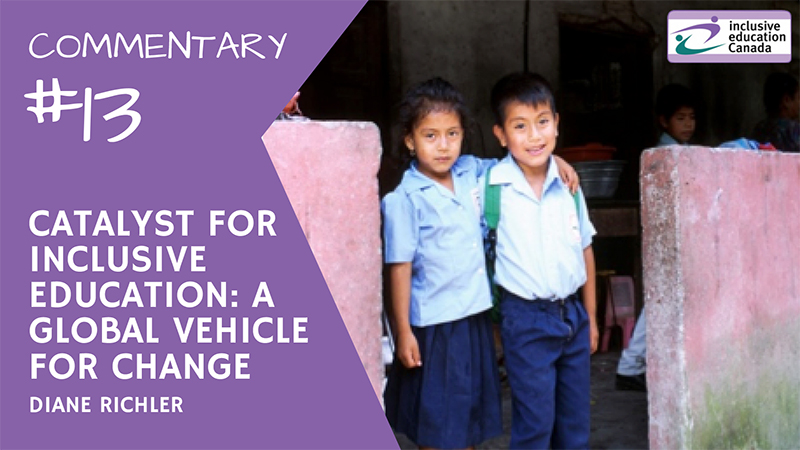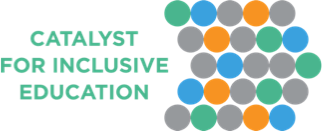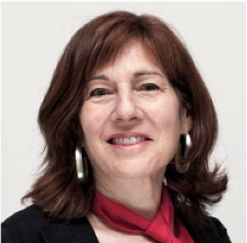 National Inclusive Education Month Commentary #13
National Inclusive Education Month Commentary #13
By Diane Richler, C.M., Chair, Inclusion International, Catalyst for Inclusive Education
Inclusive Education Canada highlights challenges and successes in achieving full, quality inclusion in our country. Inclusive Education Canada and the Canadian Association for Community Living (CACL) are also participating in a global initiative to help make inclusive education a reality for children and adolescents around the world.
Did you know that:
- Only 1 in 10 children with disabilities in developing countries attend school?
- Most of the children with disabilities who do go to school are in segregated settings?
- Children and adolescents with intellectual disabilities are the most excluded?
Inclusion International is the global federation of persons with intellectual disabilities and their families. CACL and People First of Canada are two of the 200+ national members. Recently Inclusion International has initiated a program to assist its members to serve as catalysts in improving the situation in their countries. Catalyst for Inclusive Education mobilizes Inclusion International’s network and technical expertise. Catalyst includes a platform of resources for strengthening inclusive education as well as direct support to projects, training, and consulting at a country level. Through the initiative, Inclusion International is developing the capacity to respond in real time to issues and opportunities identified by member organizations.
The Catalyst Team, which includes representatives from its members, and an Expert Advisory Group:
- Builds the leadership and capacity of our members at a local level
- Shares knowledge
- Mobilizes technical expertise of partners to advance inclusive education policy and practice around the globe
- Supports development of strategic plans and offers mentorship
 Since its inception in October 2017 the Catalyst team has conducted scoping missions to Paraguay, Peru and Nepal, consulted on proposed legislation in Colombia, assisted in a court case in Europe, and developed resource materials for global use. From the response of our members, we know that families are more convinced than ever of the benefits of inclusive education. However, it is also true that the challenges in most countries are huge.
Since its inception in October 2017 the Catalyst team has conducted scoping missions to Paraguay, Peru and Nepal, consulted on proposed legislation in Colombia, assisted in a court case in Europe, and developed resource materials for global use. From the response of our members, we know that families are more convinced than ever of the benefits of inclusive education. However, it is also true that the challenges in most countries are huge.
In Nepal, and many other countries we have engaged with, most children with intellectual and other disabilities do not go to school at all, let alone attend an inclusive one. In Latin America, if children with disabilities do go to school, it is usually to a segregated, special school. There are examples of private schools admitting children with disabilities, but in those cases, the parents usually pay 150% of the usual fee placing additional burden on families already struggling. This money is often used to employ a “shadow”, who is an assistant who is often directly supporting the child with a disability. These differences mean that some Inclusion International members are focussed on getting access for their child to any education available, while others can focus on transforming community schooling from segregated to inclusive models.
Ministries of Education have often adopted the rhetoric of inclusion, but do not demonstrate any real understanding of what is needed to achieve an inclusive system. In far too many countries, our members have found officials of the Ministries ignorant of the Convention on the Rights of Persons with Disabilities, General Comment 4, which details its implementation, or the Sustainable Development Goal of inclusive, equitable, quality education. We have found countries investing in more training of teachers specializing in specific disabilities while they fail to train regular classroom teachers to be able to teach a diverse and broader range of students.
The Global Partnership for Education is the multi-lateral agency funded by donor governments and foundations which is aiming to reach a $2 billion USD budget per year by 2020. A review of their investments shows that what little is spent on programs for students with disabilities. What they do spend goes to support special programs for those with sensory or motor impairments. It is difficult to identify any investments in provision for children with intellectual disabilities or in building education systems that are inclusive.
On a country level, most of the efforts we have seen are fragmented. Ministry efforts to reform and transform their education systems most often ignore inclusion. Consequently, the focus of our members, made up of parents and families, is at the school level. They are most often looking for basic provision for students with intellectual disability rather than on achieving our 21st Century vision of full inclusion.
The Catalyst initiative is designed to link our members’ needs to appropriate resources. So, for example, the Autonomous University of Madrid is developing a tailored on-line training course to address issues raised by our members in Latin America. The course will be launched in March. Gordon Porter, Director of Inclusive Education Canada, is developing a training package for members which will be launched at the Inclusion International World Congress in Birmingham, England in May. Jody Carr, former Minister of Education in New Brunswick has offered legal advice and is helping with analysis of policies. Vianne Timmons, President and Vice-Chancellor of the University of Regina and past-president of the International Association for the Scientific Study of Intellectual Disability (IASSID) is linking the Catalyst to the IASSID technical network.
Canada has many good examples of inclusive education in practice, and many leaders with experience in transforming systems to be inclusive. If you want to join the global network for change, contact us at: https://www.catalystforeducation.com/.
Help make inclusive education a reality for children across the globe.
 Diane Richler, C.M. is the Past-President of Inclusion International and Chair of the Catalyst for Inclusive Education. She is a former Executive Vice President of the Canadian Association for Community Living. She has provided support for inclusive education efforts on a global basis. Diane is a member of the IEC Network of Associates.
Diane Richler, C.M. is the Past-President of Inclusion International and Chair of the Catalyst for Inclusive Education. She is a former Executive Vice President of the Canadian Association for Community Living. She has provided support for inclusive education efforts on a global basis. Diane is a member of the IEC Network of Associates.
